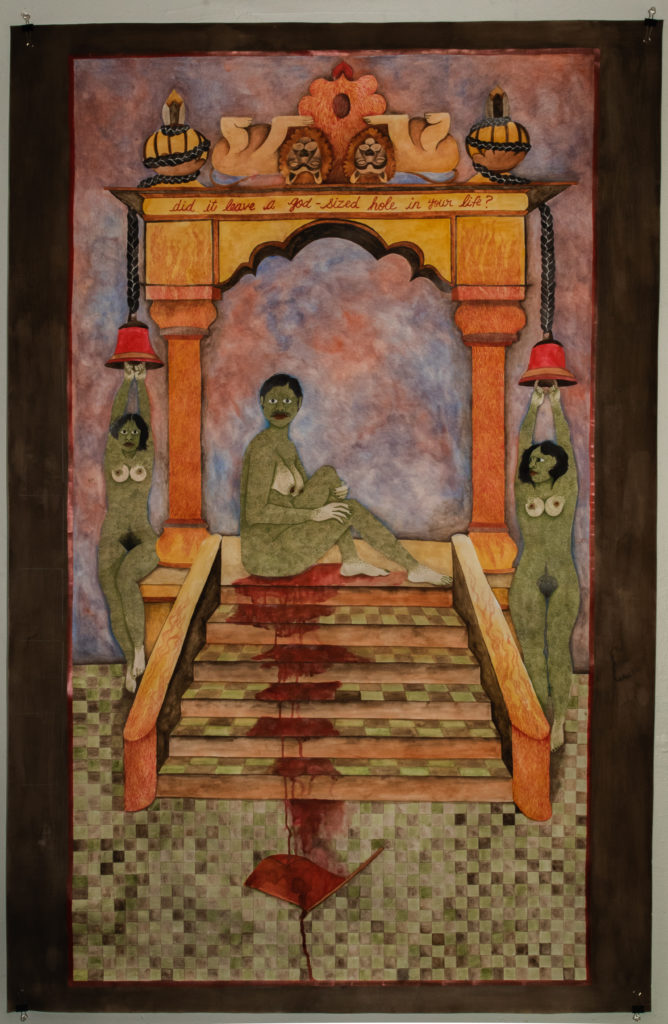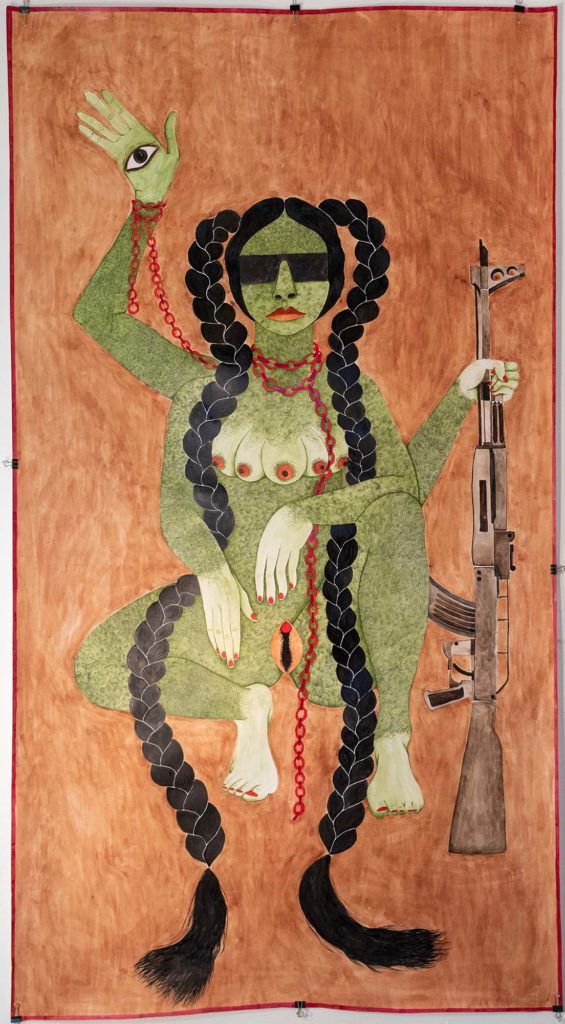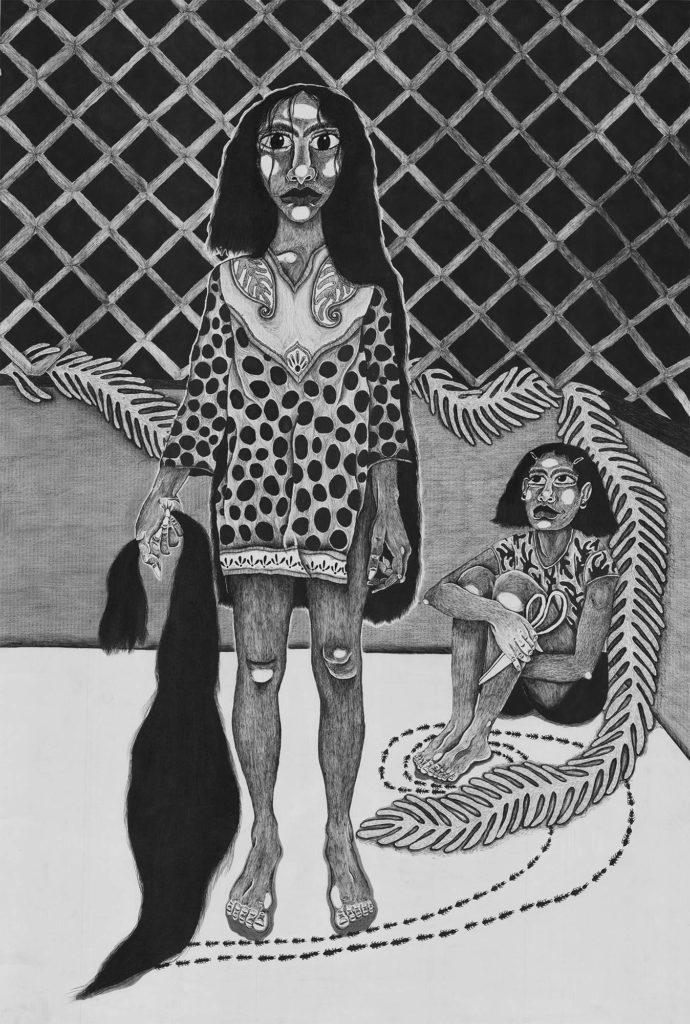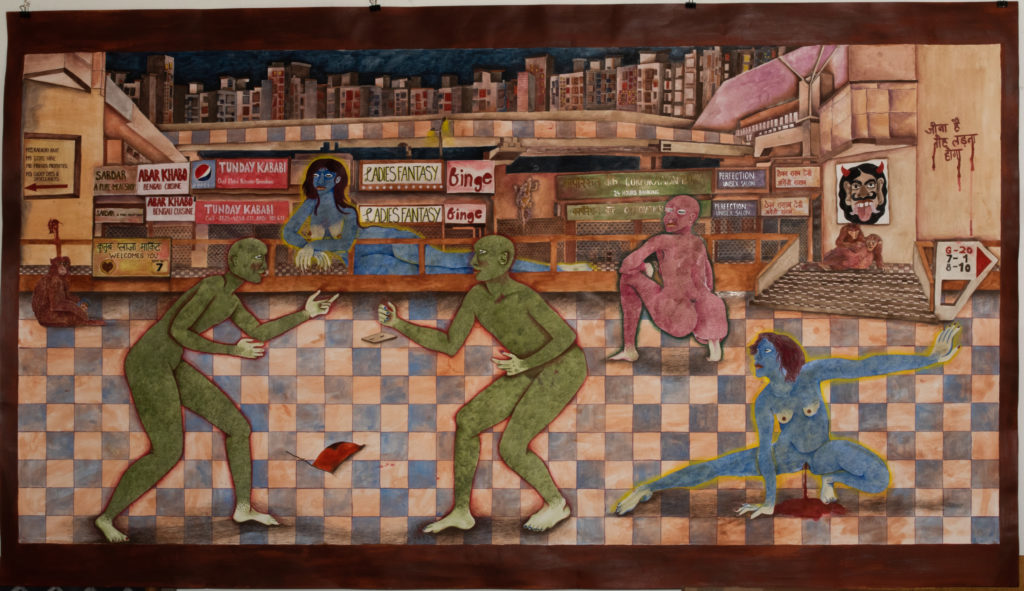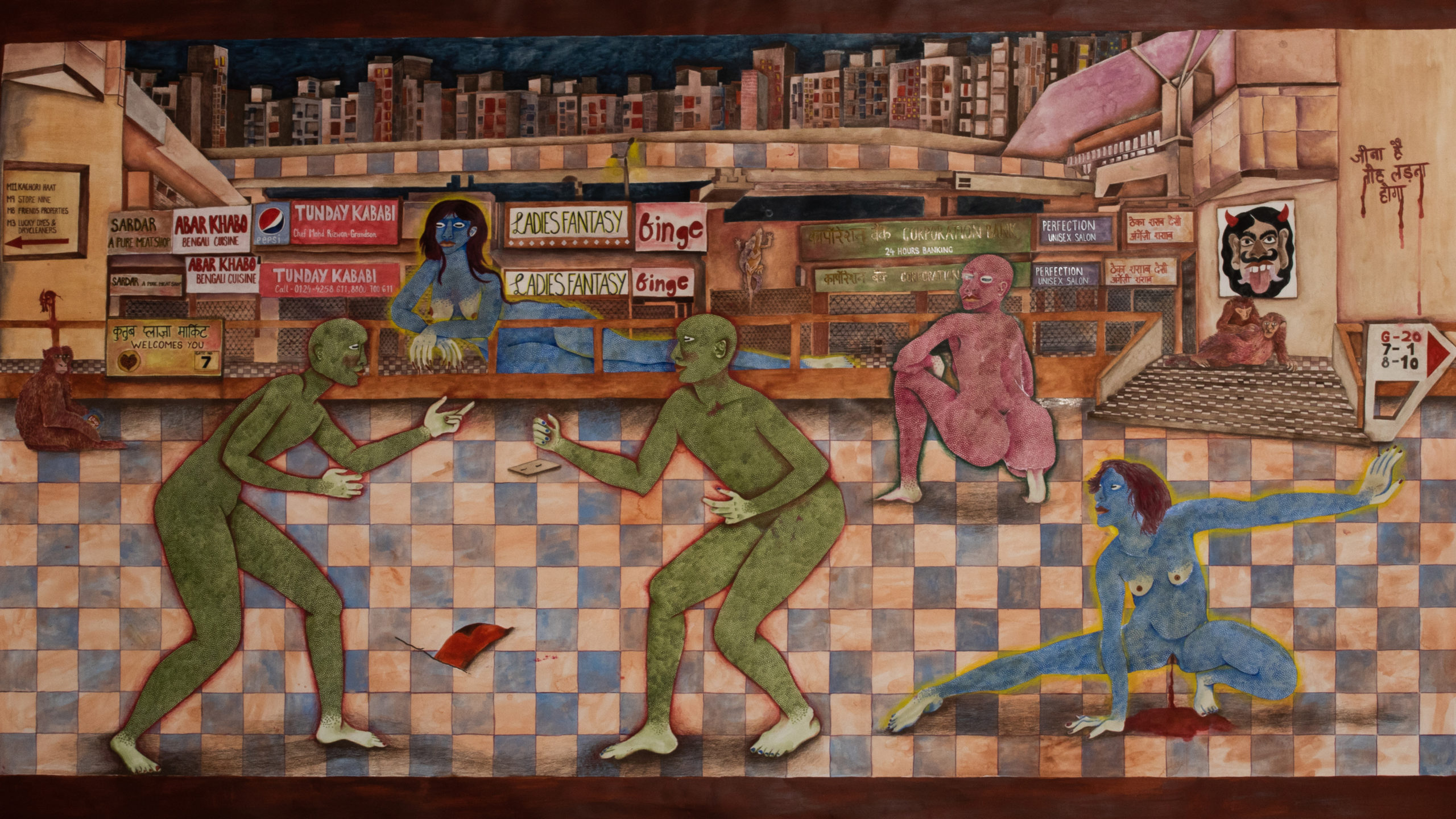 Anukriti, How to steal back your own city, 2022, Watercolor on paper
Anukriti, How to steal back your own city, 2022, Watercolor on paper Anukriti, How to steal back your own city, 2022, Watercolor on paper
Anukriti, How to steal back your own city, 2022, Watercolor on paperAnukriti: A TEMPLE FOR TIMELESS BEASTS is the fifth exhibition in the 1:1 Curatorial Initiative series presented in the Mills Gallery at Boston Center for the Arts. Each exhibition in this series presents a collaborative project between one curator and one artist, and either introduces a new artist or highlights a new aspect of a more experienced artist.
This exhibition is a sacred site for all things sacrilegious. From New Delhi to Boston, transdisciplinary artist Anukriti (they/them) presents their first-ever large-scale solo exhibition: a temple for the unconventional and queer to be revered, where Hinduism is reimagined and new gods emerge. The culmination of an artistic commitment to elevate non-conforming experiences and an ongoing embodiment of queer spirituality, the works within this temple subvert the tools of religion, inviting visitors to consider new creation myths rooted in inclusion and revolution.
Anukriti’s intricate mark-making and world-building is a meditative reinvention of prayer — an offering of cathartic devotion to the queer, hairy, curvy, kinky, Black and brown; if godhood is ephemeral and timeless, the creations in this temple claim the same for those traits. Communion is encouraged in the gallery’s reading nook, where selected texts and curated publications collectively & collaboratively expand upon the perspectives Anukriti elevates.
The Temple, a Tool: A queer Indian, Anukriti’s lived experience as a savarna1 within the constraints of Hinduism has defined the temple for them as a site of religious indoctrination, controlled by rigid norms and pious values that are imposed over historically marginalized bodies, genders, and sexualities. The temple has been used as a tool by caste Hindus to police bodies; as a site for segregation and exclusion– where women cannot enter when they are menstruating, where Dalit folks are denied access for their caste status. Anukriti’s intricate visual narratives reclaim the temple to challenge these traditions and norms that by and large are disregarded within the savarna Hindu community, envisioning liberatory realities where the temple is transformed into a tool for communion of all those who have been erased from the narrow constraints of Hindu hegemony.
The Body, a Temple: Considering the body as a temple, Anukriti subverts its religious use as a tool to disrupt tradition that is rooted in heteropatriarchy, casteism, fundamentalism, and homophobia. The non-conforming body is a recurring feature in their work, where scaled green “beasts” lounge and bleed on temple steps, where hairy bearded breasted beings tower over you or tussle on the streets. Anukriti leads viewers to deify a dramatized corporeal queer; if blue skinned, multi-limbed, anthropomorphic deities have been revered in mainstream Hindu culture, why not the Trans? The dark-skinned? The hairy? The fat? What of bodies that don’t prescribe to Hindu conventions? Given the temple as a site for reverence, monumentality, and godliness, Anukriti claims it as their own; proposing disunion from religious hegemony by claiming the authority and agency of godhood for the queer and un-conventional2 body.
The Prayer, a Protest: Anukriti’s creative process is informed by a redefining of prayer into protest, both through action and with text. To them, elaborate mark-making of body hair and intricate imagery is a symbolic reinvention of prayer and devotion. Intention, focus, and repetition are enacted in the meditative creation of these new gods. The temple is further subverted to become a site of protest– where communion is a revolutionary gathering of action. Anukriti references histories of protest in their usage of material by weaving together cardboard with metal chains, invoking DIY protest signs and counter-culture aesthetics, while framing their works with titles and quotes inspired by feminist anti-caste Indian writers & activists.
The Timeless, Transcending: Anukriti transcends cultural conformity in dominant conservative traditions by reimagining public and intimate spaces through queer, non-conforming perspectives. Yet, Anukriti also guides viewers to a newer understanding of being beyond the physical or visual. Gayatri Gopinath writes that, “if, in spatial terms, queerness names a state of being out of place, of disorientation in the landscape of heteronormativity, in temporal terms queerness has the potential to suspend the liner temporal rhythms of hetero- and homonormative life courses.” Anukriti queers archaism, disrupting the static while embracing the indefinite nature of text and temples for the timeless liberation of those like them. Their work casts the indefinable future onto a given past and declares: we are the gods of the city, the temples of today, the stewards of tomorrow.
- Savarna (English: caste Hindus) are considered part of the Hindu Varna system of social classes. Communities which belong to one of the four varnas or classes i. e. Brahmin, Kshatriya, Vaishya and Sudra are called “Savarna”. In the present-day context, they include all the forward castes.
- Un-conventional as in; steering away from, and not ascribing to, dominant Hindu cultural norms and traditions.
Public Programs
Opening Reception & Curatorial Walkthrough
Friday, October 7 | 6–9pm
During the opening reception for A Temple for Timeless Beasts, visitors will also be able to visit Project Room No. 2: Azadeh Tajpour, the second show of the new Mills Gallery Project Room Exhibition Series. Please RSVP.
Guided Walkthrough with Anukriti & Jasper A. Sanchez
-
Saturday, October 22 | 2–3pm
-
Thursday, October 27 | 5–6pm
Explore our newest 1:1 Exhibition, guided by the artist and curator! Dive into A Temple for Timeless Beasts, a temple-exhibition for the unconventional and queer to be revered. Broaden your perspectives, have a conversation, ask questions, and maybe even be asked questions yourself. Please RSVP, spots are limited.
Open Mic & Poetry Night: Prayers for Queer Salvation
Master of Ceremonies: Julissa Emile
Saturday, November 5 | 7–9pm
Join us at a poetry night and open mic for words celebrating the collective vast and ever expanding experience of queerness. This event in the Mills Gallery will close the first night of the Boston Art Book Fair, and will be a space of communion for writers, poets, and speakers to share their reflections on the topic of queer spirituality.
About
About the Artist: Anukriti
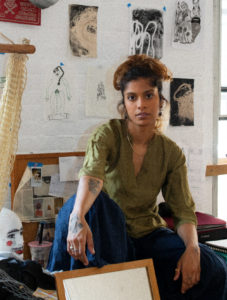
Anukriti (b. 1998, India) is a queer, non-binary multidisciplinary visual artist based in Boston and New Delhi. Working across mediums, Anukriti generates visual narratives that reconstruct gender through astute metaphor and visualization whilst challenging rigid norms and traditions pertaining to beauty, gender, sexuality and religious indoctrination.
Anukriti earned their BFA from Massachusetts College of Art and Design in 2021 where they majored in Studio for Interrelated Media (SIM). As their thesis, they curated a publication titled ‘The Body; A Beast; A Corporal Compass’ that featured works from nineteen LGBTQ+ artists. Anukriti has since attended the ‘Converging Liberations Residency’ at MASS MoCA in 2021 and is a current studio resident at Boston Center for the Arts. They have exhibited work at the Print Centre New York, International Studio and Curatorial Program (ISCP), Distillery Gallery, and Beacon Street Gallery.
Website: anukritikaushik.com
About the Curator: Jasper A. Sanchez

Jasper A. Sanchez (he/they; b. 1997, USA) is an independent curator, queer art historian, and public art enthusiast who graduated from the Art History & Critical Theory program at Lesley University. A Venezuelan-Colombian raised in Miami, FL, immersion in transnational art since their youth inspired them to focus their studies on curatorial practice with an interest in queer diaspora. He was the Rose Kennedy Greenway Conservancy’s inaugural Public Art Intern Ambassador and later developed socially engaged art projects within Lesley’s Office of Community Engagement. Sanchez has programmed with the Boston LGBTQIA+ Artist Alliance (BLAA) and curated exhibitions at Distillery Gallery and Boston Cyberarts Gallery. He is currently Curatorial Assistant with public art organization Now + There, where he is helping curate temporary, site-specific experiences aiming to make public space in Boston more caring, equitable, and welcoming for all.
Instagram: @jasper_a_sanchez
